Dragon Door Interviews RKC and Beast Tamer, Jason Kapnick
Interview by Adrienne Harvey, PCC TL, RKC II, CK-FMS, Primal Move Nat'l Instructor
June 15, 2013 11:00 AM
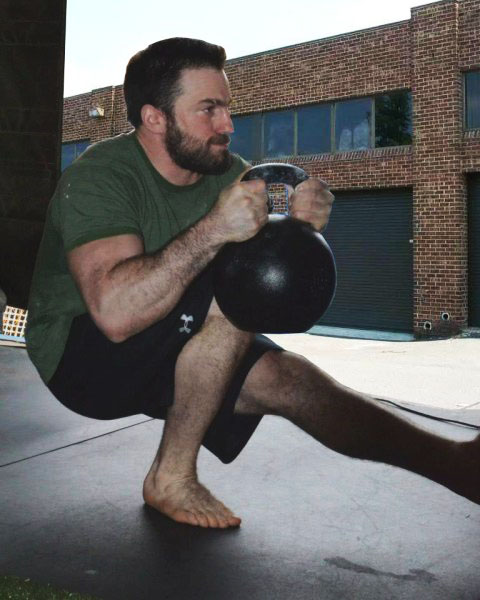
Dragon Door: When we spoke earlier you mentioned that you've been in the fitness industry for a few years but didn't start out there. What inspired the change?
Jason Kapnick: I was an investment banker for three years right out of school and made the switch to personal training about two years ago. I've been into fitness since lifting weights at age fifteen. Fitness was always my first love, even when I was in banking, I read fitness books in my time off. Eventually, I got to a point where I'd learned a lot about investment banking, but I didn’t see myself spending the rest of my life there.
During a dinner with my cousin, I told him how I was getting a little frustrated with finance and wished I could do fitness full-time. Before he had a chance to answer, I thought, wait a minute—why not? A few months later I left banking and have never regretted it. I love what I do now.
Dragon Door: Where are you working?
Jason Kapnick: I’m working out of a New York Sports Clubs commercial gym, primarily training clients one on one, but I also teach small group classes. We have a nice set up in the middle of the gym with about 800 square feet of turf for swinging kettlebells, performing Turkish get-ups and TRX.
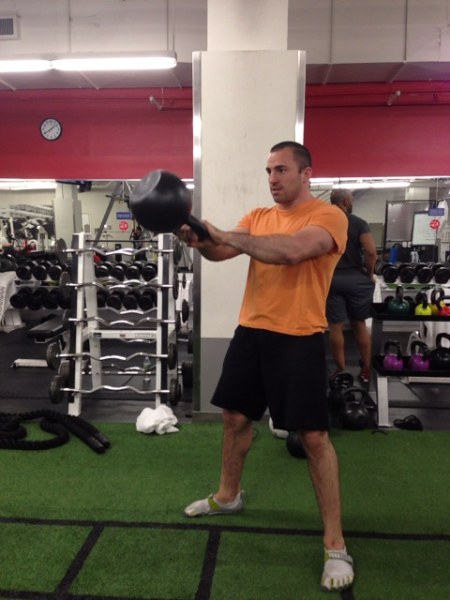
Dragon Door: How did you first find out about kettlebells?
Jason Kapnick: In 2006-2077, before graduating from Emory, I was training a lot in Brazilian jujitsu—about twelve classes a week. I remember hearing about Pavel’s books, and began reading about kettlebells before I even had access to them!
When I moved to New York City in 2008, I joined New York Sports Clubs as a member. They had some kettlebells, so I started trying to apply what I’d learned from the books. When I started working at NYSC in 2011, another trainer at the gym, Joe Boffi—who also became an RKC with me in Vienna, Virginia—had been training with Ari Harris. Joe had started teaching me, and eventually Ari worked with us when he visited the city.
Dragon Door: What inspired you to become an RKC?
Jason Kapnick: When I first read Enter the Kettlebell, I learned about the RKC and was curious. It seemed so expensive, but I saw how everyone put the letters after their name. Tim Ferris likes to say success leaves clues—the RKC community has left many clues about its very successful training methodology. I've wanted to do the RKC workshop for at least four years. I’m glad I was finally able to do it this past weekend, and it certainly lived up to my expectations.
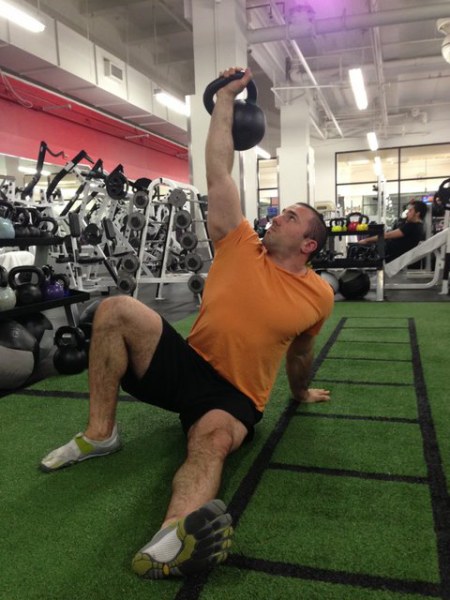
Dragon Door: What have been some of the biggest benefits you and your clients have experienced by training with kettlebells?
Jason Kapnick: I've noticed that I just stay leaner without having to change anything else. Our gym’s kettlebells only go up to about 28 kg, so a little over a year ago, Joe and I bought a 48kg Beast. When we started swinging it regularly we got leaner, gained more power, and more hip drive.
My clients are seeing similar results and are getting stronger without sacrificing movement. They also think it's fun, and love their results. Nothing gets the heart rate going like a set of heavy kettlebell swings! The Turkish get-up is also a big part of my training philosophy. Many of my clientele are former athletes or fairly athletic people who aren't currently competing. They don't want come in and just do corrective exercises for an hour, so adding the Turkish get-up into the program maintains their mobility and adds an injury prevention component.
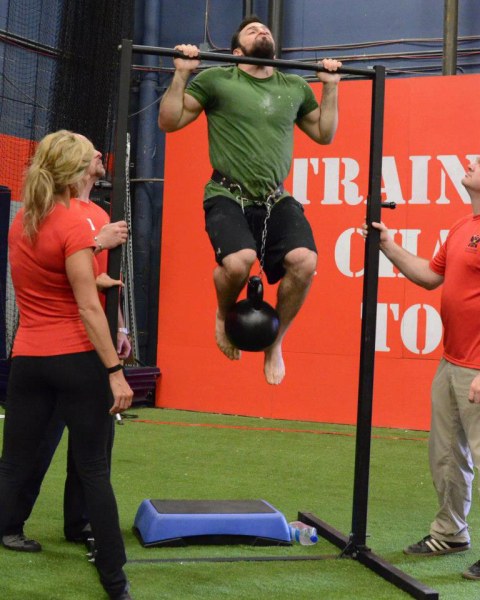
Dragon Door: How did you decide to attempt the Beast Tamer Challenge?
Jason Kapnick: About six weeks ago, Ari Harris and Kathy Dooley came to the gym with Joe and I. We met at 2PM on a Friday afternoon and did the "deck of death" workout. It took us over three hours without breaks to get through a deck of cards. We chose a pretty tough selection of exercises too—loaded carries, super heavy get-ups, snatches, double jerks, and more.
After the workout, Kathy gave me an assessment and found some interesting movement issues. Later at dinner with Joe, Kathy, and my girlfriend, Kathy asked if I was going to try the Beast Tamer at the RKC. I'd known about the challenge for years and had a lot of respect for it, but said no, because I couldn’t get the pistol. I had been a toe walker until I was eight, when I had a Z-cut surgery to try and lengthen my achilles tendons. According to modern medicine, I shouldn’t be able to do a pistol at all. I had only done pistols a few times, and these were either down the side of a hill or with my heel elevated. Kathy said, "We’ve got six weeks to get you there."
I started implementing the correctives she gave me next day, every hour on the hour. These correctives really didn’t involve dorsiflexion—the biggest power leaks were in my upper body— my T-spine was locked up and my core was not firing properly. She had me practice rolling patterns, which were actually the weakest link in the chain. I did a lot of external oblique and internal oblique release stretches, and t-spine extensions. This started opening up my t-spine which gave my core permission to fire properly, translating into a tremendous increase in both my mobility and stability.
Kathy does a great job of keeping correctives simple, otherwise they’re not going to get done. On Sunday I practiced the correctives even more, then decided to just try and see if I could do a pistol onto an 18 inch box. I'd tried it before and had never been able to really get down to the box smoothly. This time, I could get down to the box after just two days. It wasn’t perfect but it was a huge improvement.
That Monday I started working with Joe Boffi who's great at pistols—he's always doing them around the gym, and even depth-jump pistols. He had me start by using the TRX for support, and by the end of the day I was doing pistols just using a 24kg kettlebell as a counterbalance!
Once I saw I could do it, everything was downhill. It was never a strength issue, getting up was easy, even with the Beast. Getting down was the hard part. So, between clients or when I was just at the gym I was practicing pistols with a counterbalance. On Thursday, a few of us were sitting around between clients, and I decided to try a pistol with the Beast. It was a little shaky and the opposite leg came down a little too soon, but I hit the Beast pistol after just six days. From there, I kept using the 24 kg to "grease the groove." We joked that my sweet spot is the 32kg—it gives me enough counterbalance that the dorsiflexion isn't an issue but it’s not enough weight to really challenge me. At the RKC, the pistol couldn’t have gone any better, it was really exciting!
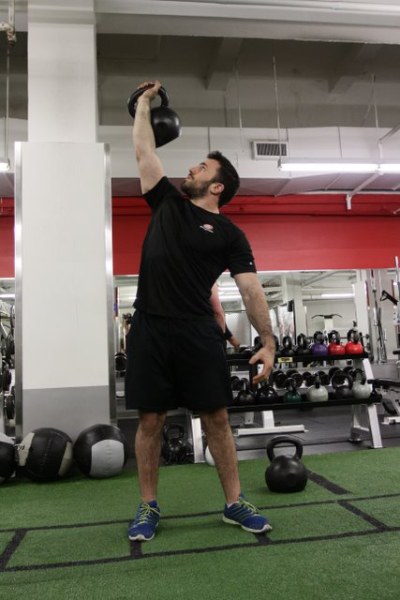
Dragon Door: How and when did you begin strength training?
Jason Kapnick: I’ve always been focused on strength. As a little kid, my dad would take me to see parked construction equipment and I would pretend to pull it while saying, "I’m Hercules!" At my yearly check up, I would always ask the pediatrician when I could start lifting weights.
They finally let me lift weights in high school. My grandfather was a strong guy and took me to the gym when I was fifteen. I remember he was doing some tricep extensions with the whole stack at age 77. His face was turning red and he was battling the iron with intensity and tenacity—just fighting for every rep. Seeing the way my grandfather lifted really changed things for me.
Throughout high school I played lacrosse, and for about a year and a half at a Division I school. I wish I had known about kettlebells in high school, but all I knew about strength and conditioning back then—like most other young guys in this country—came from bodybuilding. Fortunately, I focused on compound lifts like squats and deadlifts from the beginning. I was pretty strong, and was a four plate squatter in high school to depth. Playing lacrosse in college, I learned to power clean along with other Olympic lifts. During my sophomore year, I transferred to Emory, where I didn’t play lacrosse but really got into Brazilian jijutsu—I just love grappling. I wasn’t doing really a whole lot of strength training there just because I was grappling 12 to 14 times a week.
After graduating, I got a job on Wall Street and started lifting weights again just to stay healthy. Even then, I was deadlifting pretty heavy—in the 500s even as an investment professional. My buddy, Joe Ambrose—who's still in the finance world—had some Captains of Crush grippers on his desk, which is how we became friends. He competed in powerlifting and talked me into a meet in December of 2009. A little more than a year later, at the WNPF, I set an unofficial (the record couldn't be set at a State meet) world record deadlift, 605lbs at 181lbs body weight.
When it comes to movements like a pistol, I just had to fix the weakest link, because my body could already handle the strength aspect of it. Deadlifts have always been my bread-and-butter, it really is the core of all strength movements. When we talk about rooting strength to the floor, core strength, core stability, glute strength and grip, what could be better than deadlifts?
Dragon Door: Now that you are an RKC, are you going to be doing anything differently at the gym?
Jason Kapnick: I’ll be doing the same things, but better. The RKC principles have been a big part of what I’ve been doing for the past year and half. I received great instruction, Jon Engum and my team leader, Tim Spencer were fantastic. The devil's in the details with kettlebells, and I got so many great details from the RKC. It will take me a few months to give my clients all the knowledge that I took in during those three days.
Dragon Door: What's the biggest thing you learned at the RKC?
Jason Kapnick: The biggest thing was learning to finish my swings stronger. Finishing the top of the swing with a powerful contraction of the glutes, abs, pulling up the knees, and rooting into the floor was very powerful. When it was time for the snatch test, I couldn’t believe how easy it became after I learned to tighten up the lockout on the swing.
Dragon Door: I’m sure you've already seen that with the lockout on your deadlift as well.
Jason Kapnick: Absolutely. I wasn’t really training a whole lot of deadlifts this year, but two weeks before the RKC I tried to deadlift six plates. I thought it would be tough, but it was super easy. I've also stopped wearing a belt and that's improved the way my back feels immeasurably. I'd hardly deadlifted this year, and even without a belt I'm now pulling close to what I was a year ago in competition, which now feels super easy in the gym. I think it’s from core stability built from one arm swings.
Dragon Door: That’s awesome, thank you so much for taking the time to talk to me today.
Jason Kapnick: Thank you for interviewing me.

Reach Beast Tamer and RKC Jason Kapnick at:
201-317-3160
Back